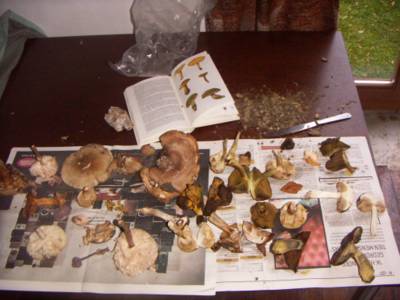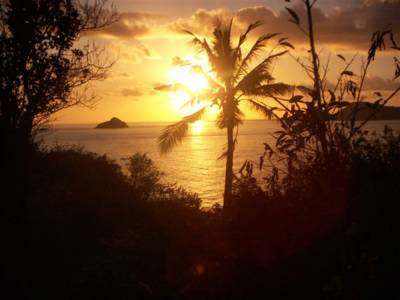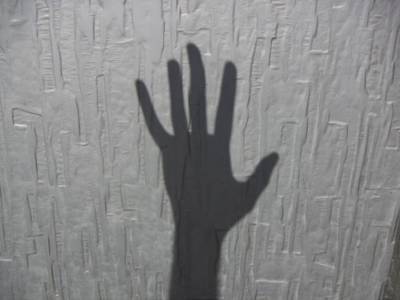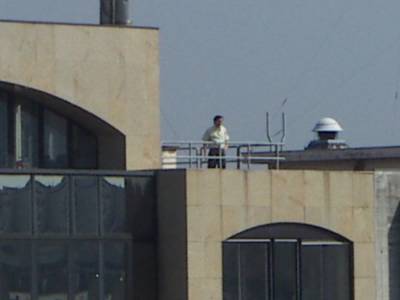
Commenting on this post, Anonymous says:
From someone who strongly disagrees with the above review.....it would be nice to have some depth into the criticism instead of words like sameness, lack of ass. Come on! You obviously have something against the woman, but at least say something constructive. "Fine player" was right in any case.
Well, my dear Anonymous, believe it or not, I have nothing "against the woman" (Nathalie Loriers). I don't have "anything for the woman" either. I have never even talked to her. The closest I got was exchanging a few words with her then-husband Diederik Wissels after a concert, as Loriers sat nearby.
As I said in the post, I've listened to her in several settings and am generally uninterested. Maybe I'll put Timbuctou back on one of these days and my opinion will change radically, but I'm not holding my breath. Why do you like her?
Sunday, October 31, 2004
wesssiiiiiiiide!

I've seen West Side Story a half-dozen times at least, but until last night hadn't seen it it about 13 years (half a lifetime ago!). Was flipping through the channels last night and caught right from the opening theme. Conversations were dubbed into French, but thankfully the original soundtrack was reverted to for the songs.
You don't need me to tell you how cool the music is, but listening to it with my now-wizened ears was great, a near-total rediscovery. It's awesome that this music can appeal directly to a child and engage an adult. I'd always loved the "Say it soft, and it's almost like praying" line in "Maria," but this time around also listened carefully to how "Cool" unfolded. A nice change from so much cookie-cutter film music.
It's funny how these tough gang members are probably mostly gay and the lead Portorican is Greek.
Posted by
Moandji Ezana
|
permalink
|
|
![]()
Thursday, October 28, 2004

Guillermo E. Brown Black Dreams 1.0
A bad review.
A good review.
My review.
Some music:
MP3 Guillermo E. Brown "Octaroon"
Posted by
Moandji Ezana
|
permalink
|
|
![]()
Tuur Florizoone + "The General" - 27/10/2004, Brussels

Not much to say about the film apart from
Slapstick 4 evah!
The show was scheduled to start at 9PM. At about 8:55, as I was making my way there I spotted Tuur ordering a durum and then walking away from the bar.
He followed the movie much more precisely and concretely than Dumoulin did a few of weeks ago, imitating trains, playing musette, tango and pseudo-military songs. Good fun.
---
In random be.news that I'd forgotten to report, Nicolas Kummert says that 4, who released a good album on Mogno, has recorded a new one and is looking for a label.
Posted by
Moandji Ezana
|
permalink
|
|
![]()
labels: café central, concerts, movies
Wednesday, October 27, 2004
Van Hove-Lytton / Rutherford / Demey-Laffut - 26/10/2004, Brussels

Okay, sometimes you just have to get off the fence: I like free jazz, but don't like Euro free improv very much. Peter Brötzmann with William Parker and Hamid Drake (and possibly Toshinori Kondo), the Brotherhood of Breath, Brötzmann's Chicago Tentet, the little Anthony Braxton I've heard: very much yes; this other stuff, not much at all, no. I've always thought that the main difference was one of rhythm and that was highlighted by the 10-15 minutes of the first duo I caught last night.
Belgians Jean Demey on bass and Léon Laffut on piano may have been making lots of weird noises, but rhythmically it sounded more like W.A. Mozart than C. Parker, to me.
Then English trombonist Paul Rutherford did a 20-25 minute solo set, flutter-tonguing, multiphonicking, ultra-low murmuring, droning and even real noting his way around in playful fashion. Actually, compared to the Englishmen, the Belgians seemed to totally lack a sense of humour: Rutherford's was expansive, Lytton's deadpan, but the the Belgians were just kind of gray and serious.
As a comedy climax, Rutherford took his slide down as far as it would go - and kept on going, sliding it off completely. He then proceeded to pour the spit accumulated in the slide over the remaining half of the trombone, play with the slide, with half of the slide on, then finally put the whole thing back together.
The main act came on after an intermission: Fred Van Hove on piano and Paul Lytton on drums. I've never heard him on CD, but I've seen Van Hove 2 or 3 times now and just don't like him. It may have something to do with the visuals: I find myself irritated by his limp-wristed playing style. An early climax (while I was still paying close attention?) was pretty cool, though, with the pianist playing mysterious and sparkling two-handed upper-register glissandos.
Lytton, despite playing on a mere standard drum kit, had a huge palette of sounds thanks to a veritable arsenal of jangly implements. Early on he crushed a small plastic cup onto his snare drum, later on an eerie calm reigned as Van Hove rubbed the piano strings to make slide guitar sounds as Lytton rolled small metal balls in a small gong. During the short second piece, Lytton dropped in heavy bass drum kicks, which seemed to bounce like a heavy ball atop the ambient clatter. Still, the pickings for me were pretty slim. A Rutherford-Lytton duo would probably have been better, though.
Just when I'd sworn it all off, they announced a Chris Burn Ensemble concert in January, including John Butcher. I caught a fascinating 15 minutes of Butcher a very long while ago (playing with Phil Minton and Veryan Weston), so now I have to check it out. Maybe I'm still on the fence.
Some great descriptions of the early efi (1974) days in the programme notes, particularly the mention of the front of the audience at a Van Hove-Brötzmann-Bennink concert having to move back two rows because of exploding sticks and flying woodblocks, cymbals, branches and miscellaneous percussive objects.
As I stepped back into the car, Marc van den Hoofd was starting his jazz show, focusing on Bill Evans. As "Philly" Joe Jones bashed at a clave-ish beat, I thought I could just about make out a transhistorical and transatlantic link to Lytton.
Posted by
Moandji Ezana
|
permalink
|
|
![]()
Tuesday, October 26, 2004
Now that's what I call be.music #4

Chris McGregor's Brotherhood of Breath "Andromeda" From Bremen to Bridgwater
As "Union Special" draws to a close, the Bremen crowd erupts, demanding more. They get it, but the Brotherhood forgets it's playing for beardy German free jazz fans from the '70s and instead imagines itself to be an African Count Basie Orchestra playing for the lindy-hoppers. Out of context, it's not as much of a "so orgasmic you just implode" moment, so no MP3.
Posted by
Moandji Ezana
|
permalink
|
|
![]()
Monday, October 25, 2004
Wot?

Miles Davis, June 11th, 1975.
When, 35 minutes in, the music turns soft, opens up and allows luxuriant soul to waft up, I'm reminded of Ghostface's The Pretty Toney Album: hard-hitting and gangsta (in Miles's case, unrelenting wall-of-noise turmoil, funk and guitar chords seemingly ripped out of the instrument), but turning to soul for solace.
Listening to the fabled complete Cellar Door recordings (excerpts of which are in Live-Evil), with Miles in full Jack Johnson mode, Jack DeJohnette pounding a blissful blend of funk immediacy and jazz interactivity ("Yesternow" as a latter-day "John S."?) and Keith Jarrett playing a never-to-be Fender Rhodes future (that comping behind Bartz after 11 minutes? That melodico-abstract-clear-mush solo afterwards? Among so many other things you'd never hear in today's polished keyboard world...), I'm reminded that "influenced by '70s-era Miles" comparaisons applied to people like Nils Petter Molvaer (not that I haven't used that particular facility myself) are, if not entirely false, then at least partially so. Miles is playing fire music, or at least sweat music, the modern day electro-Norwegians don't, even when they play LOUD. Think of Clifford Brown and Chet Baker.
A parallel to currently getting seriously into Andrew Hill for the first time: both Davis and Hill are "Wot Do U Call It" musicians. When I saw Hill, he ran rings around my expectations and knowledge of the music: "So jazz can be like this, too?" was the dominant thought. Black Fire shows how he taught himself this trick 40 years ago. Miles at the Cellar Door: rock? are you kidding me? Incredibly funky, yes, but not funk: jazz had had the same kind of relationship to funk and r'n'b for a long time and to the blues right from the beginning. So, by default perhaps, by sweaty TKO, definitely, it's jazz, leading to a sadly ongoing pondering of what jazz is and is not while the world keeps on turning and the revolutions make the pondering quaint.
Posted by
Moandji Ezana
|
permalink
|
|
![]()
Trio Grande + Ananke - 21/10/2004

The Botanique's cozy yet sightline-challenged brick-pillar-arches basement club/bar has been renamed Witloof (pronounced witloaf) Bar. Why? The smell of casually-smoked marijuana floated through the air and sent me dreaming of a fantasy-land of smoke-deprived concerts.
Ananke: three endearingly dopey-looking kids and an equally young but less dopey saxophonist making music that is an improbable mix of AKA Moon and l'Ame des Poètes. In other words, drums, bass and keyboards laid down complex, poly-everything funk/rock/kinda jazz rhythms and fusion-type whole-band unisons, while keeping the improvisations very melodic, almost sing-songy and very focused within strict, shifting arrangements. Highlights: AKA Moon salsa and a keyboard intro with excellent use of the different available (strike-strength dependent?) timbres.
Listen to the music at www.ananke.be.
Trio Grande: Michel Debrulle on drums and Michel Massot on tuba/euphonium/trombone + another musician. In the '80s it was Fabrizio Cassol, in the '90s and early '00s another saxophonist, Laurent Dehors, and now it's a younger guitarist, Benoist Eil. His name reminds you that circonflex accents replace an ancestral s.
The fantabulous repertoire of Massot and Debrulle songs that fueled the 2001 album Signé is still in circulation, but totally different. The concert with Dehors I saw 2-3 years ago was a barrelling, irresistibly dancey free-jazz affair, whereas this concert was far more subdued, yet still intense. Debrulle plays a kind of loose'n'dirty funk/rock, Massot blows both crazy dijeridoo overtones and delicate bluesy half-valve effects and Eil brought a disrupting, free-rock/punk element, but at low volume. I don't know if it's his tuning, but every note managed to sound dissonant, in a cool way. On the last song of the set, he took his banjo and played an unaccompanied intro that started out with pointillistic noise, then moved to a blend of bluegrass and raga. Debrulle and Massot (on trombone) joined in and they started playing quasi-country music.
It had been so long, I'd forgotten that Trio Grande was one of my favourite Belgian jazz bands. No recordings of the new line-up yet and it's difficult to isolate something from this fantastic album (go get it!) but here's a little something from Signé so funky you won't notice the 7/4, especially as Dehors takes it back to essentials for his solo (a pitch, a timbre):
MP3 Trio Grande "Griffure de Cestin"
Posted by
Moandji Ezana
|
permalink
|
|
![]()
Friday, October 22, 2004
Sex 'n' Drugs 'n' Rock 'n' Roll: two out of three ain't bad in Norway
[cf. picture below]
Madonna/Britney/Christina have nothing over these Norwegians. And, yes, it was all caught on film.
Posted by
Moandji Ezana
|
permalink
|
|
![]()
Wednesday, October 20, 2004
Tuesday, October 19, 2004
Now that's what I call be.music #3

Ella Fitzgerald "The Nearness of You" on Ella Fitzgerald and Louis Armstrong
It's difficult not to feel that Ella is touching upon the divine here, injecting strategically-placed heart-melting fragility in the midst of her perfect control. Helped along by the rhythm section: Ray Brown's syncopated stumbling upon the strong beats, Buddy Rich tiptoeing around him, Armstrong's trumpet off in the background, thickening the sound. When Louis's turn to sing comes, the beat strengthens, with Brown laying down a walking pattern, but they had done it better on the preceding "Cheek to Cheek."
Posted by
Moandji Ezana
|
permalink
|
|
![]()
Monday, October 18, 2004

Stefano Di Battista - Parker's Mood
Stefano Di Battista, Italian alto and soprano saxophone player, necrophiliac. I pour plenty of French-language vitriol on this one, but really, one has only to read Blue Note's promo material to see how vile this album is. And yet, I've only seen positive reviews so far, praising Di Battista's skills, humility and whatever, which is equally horrifying.
Bruno Vansina - Trio Music
Bruno Vansina, Belgian alto and soprano saxophone player. It could be that I'm just standing up for the little guy, or that I've met Vansina and not Di Battista, or that I just like one more than the other. Still, if jazz fans can't tell the difference between Vansina's "Dear Old Stockholm" and Di Battista's "Embraceable You," then we deserve our fate.
Posted by
Moandji Ezana
|
permalink
|
|
![]()
Saturday, October 16, 2004
Syrinx Ensemble - Brussels, 13/10/2004

I didn't get lost. I found a nearby parking spot right away. Things only got weirder when I entered the venue and realised that I had been here before, at least a year ago if not more, for a salsa party. In fact, the salsa stories in the post about dancing were taken from that night. Proving Greg Sandow right, the crowd was mostly by far older than the musicians. Needless to say, I felt a bit out of place, but there were a few other younger people there: Bram Van Camp, whose "Hidden Facts" was to be played and some friends of his.
Syrinx (flute, English horn, clarinet, French horn (a lot bigger than I imagined) and bassoon) played one piece each by 6 Belgian composers, adding a pianist on the first and last, and one solo piano. Lots of pieces, so none was too long. I was held in a state of semi-amusement throughout by the bassoonist: being the only man in the middle of a semi-circle of women, his posture, jovial manner and the sound of his instrument conspired to make it seem as if he was telling fart jokes all night long. But there were serious matters to attend to as well.
The concert opened with Arthur Meulemans's "Aubade." The MC at one point used the term "light music," which I found a bit odd, as a lot of what falls under that umbrella (jazz, for example) is actually "heavier" than this 1934 Edvard Grieg "At Dawn"-like piece, which was as light and refreshing as morning dew. We then scrolled ahead a few decades to 1962 for Elias Gistelinck's "Suite for Wind Quintet op. 4." I don't know the stylistic terms, but this one consisted of 4 short movements and lots of fragmentary, sharply punctuated and quizzical statements, which sometimes (and happily) blended into a mushier collective that sounded a bit like chamber free jazz.
The third composition was Boudewijn Buckinx's "De Tijd op een Kier zetten" (1990). I don't know what kier means, so I won't bother translating the rest (apparently the title is funny). This one was more melodic, proceeded at a deliberate pace and went from initial slight melancholy to quiet optimism at the end. There were some cool bassoon/French horn hookups as the latter prolonged the former's notes. The last piece before intermission was Wilfried Westerlinck's "Landschappen I" from 1977 which intended to map an interior landscape. A highlight was a flute line that seemed to endlessly fold back upon itself and served as the transition point between frenetic, staccato lines and investigations of the murkier, stiller waters formed by the English horn sailing over the acompaniment's small interval dissonance.
INTERMISSION
Bram's piece was introduced by an "interview" conducted by the MC. He's a very good talker. "Hidden Facts" (2004) was split up into 3 barely-separated movements (the traditional allegro-adagio-allegro) and drew on a language similar to that of the more modern and thorny pieces played. Highlights to me were the exciting end of the first allegro, powered from below, and the English horn melody, accompanied only by flute and clarinet, to beautiful-yet-disturbed effect.
Brecht Degryse came on to play the piano piece, Marcel De Jonghe's "Introspection V." It's programme was to evoke first the way the world should be (harmonious), the way it is (harsh) and the poetic world of the composer. A bit twee, perhaps, but it was okay, with the third part as obviously the heart of the composition.
Finally came "Rhapsody op. 70" (1922) by Joseph Jongen, who is, I suppose, the most famous of all 7 composers. By far the longest piece, it started with old-time "falling into a dream" movie music: sweet long-note melodies accompanied by billowing piano arpeggios. A highlight was when the piano fueled the group with a steady, tango-ish rhythmic figure.
Not a lot of emotional description in the above: while I like some of the sounds, I don't really connect with these musics. My recent classical concert-going has yielded some questions: do orchestras really need so many percussionists who don't really do that much? Why not get a drummer and save some money? Did what I imagine to be the general unavailability of page-turners for pianists influence the direction of jazz composition?
Posted by
Moandji Ezana
|
permalink
|
|
![]()
Wednesday, October 13, 2004
Now that's what I call be.music #2

Jill Scott "Golden" Beautifully Human
3-beat vocal chorus against 4/4 beat gives a nice "lost in the music" effect, even if it's resolved with an extra "golden" at the end. The sped-up and stripped downWookie remix flies by so fast that the effect is somewhat lost.
Not quite what I intended as NTWICB.M #2, oh well...
Posted by
Moandji Ezana
|
permalink
|
|
![]()
like I need an excuse to post a photo

As luck would have it Lethal B. inserted himself just before Lil Jon and The Eastside Bozy in my iTunes library. "Forward Riddim" to "Get Low," London to the Dirty South makes far too much sense (late to that party, I know, but I'm just a jazz fan in rural Belgium).
From that back to Sonny Rollins? Coming soon. (?)
Posted by
Moandji Ezana
|
permalink
|
|
![]()
Tuesday, October 12, 2004
Last night an MP3 blog saved my life

After listening to Lonnie Liston Smith's "Expansions" (downloaded from mp3 blog Funk You), I had to go to the corresponding Amazon page to make sure that what I had just listened to was, indeed, recorded in 1974: it sounds exactly like St Germain-era electro-jazz made 25 years later, right down to the use of keyboards and flute solo. Which makes the authors of articles from the time (and of today, because they continue to appear) dubbing that kind of music "The future of jazz" sound like idiots with no knowledge of the music's history.
Posted by
Moandji Ezana
|
permalink
|
|
![]()
Monday, October 11, 2004
"relaxed but not soporific electronic pop with dashes of jazz and exotica"
August Enkilde - Presents Electronic Panorama Orchestra
Posted by
Moandji Ezana
|
permalink
|
|
![]()
Sunday, October 10, 2004

A video of Thelonious Monk's quartet playing "Rhythm A Ning". Essential viewing if, like me, you've never actually seen the man play.
Charlie Rouse - surprisingly immobile as he plays this dancing music, eyes closed.
The master - oddly plucking the the joyous line with both hands.
The drummer - (Ben Riley?) awesomely sober technique: minimal movement, but his ride cymbal settles like fairy dust when he comes back in in the middle of the bass solo.
A great performance, even if (or perhaps, even more impressive because) it is clear that they churned out this level of music night after night.
Posted by
Moandji Ezana
|
permalink
|
|
![]()
Thursday, October 07, 2004
Fritz Lang "Metropolis" + Jozef Dumoulin, Brussels 06/10/2004

What an intense film - wow. In stillness (the opening scene with the workers changing shifts) or frenzy (robot-Maria casting a spell over the ravenous men combined with Freder's fever dream) - wow. I don't know if it was intentional or not, but don't the workers end up looking like idiots, letting themselves be dragged from one collective frenzy to the next?
Jozef Dumoulin accompanied all this on Fender Rhodes, building his own narratives whose arcs rarely fitted in scene-by-scene, but always landed in a way that made their course seem logical, in retrospect. Generally, it sounded loosely-composed, but I had to run straight after the show and didn't get a chance to ask Jozef. Maybe he'll answer in the comments box?
He started with a mix of bubbly and percussive sounds that began with the opening credits and continued throughout the initial scenes in the worker city. Things became a bit sparklier overground and a major theme was introduced when Maria brought the worker children in: "Somewhere Over the Rainbow," here played in full, would re-appear many times and in different guises to accompany Maria's side of the story. During the mass, the melody donned a halo of divine chorale chords, while a few notes, bent and ugly, bubbled up from surrounding noise for robot-Maria. Finally, after an incredibly long bout of Hendrixian squalls of noise, bombastic arena rock-god riffs, a few spots of more poppish repose, abstract jazz lines and churning percussion, "Rainbow" reappeared for the Happy End.
Lately I'd been thinking that keyboards in jazz had become rather boring. Back in the day, Keith Jarrett and Chick Corea litterally didn't really know what they were doing, or control their instruments 100%. As a result, there's a sense of danger and plenty of dirt. And I haven't even mentioned Sun Ra yet. Nowadays, it all sounds rather clean and abtruse abstraction sounds more like a refuge than a battle-field. But (and you knew a "but" was coming and where it's going, right?) Jozef puts a lot of dirtiness back in, a bit of danger and madness. In fact, more and more every time I see him, it seems. I'd still like to hear him on piano, but I've been saying that for years now...
Posted by
Moandji Ezana
|
permalink
|
|
![]()
Tuesday, October 05, 2004
>>
Started with a use for the Next Blog link;
School reading blog, includes informative information:
Stripes of the sidestep wolf
I haven't started reading it yet.
posted by florencelamour at 1:01 AM;
BBQ'ing, includes the line "my brothers in smoke";
A new blog that still needs to straighten things out;
A housewife's journal that's interesting in a quiet, mundane, terrifying way.
It's really quite a miracle blogrolls are as long as they are.
Posted by
Moandji Ezana
|
permalink
|
|
![]()
This is Polar Bear: interview (in english) and photos on One Final Note.
Posted by
Moandji Ezana
|
permalink
|
|
![]()
Monday, October 04, 2004
Now that's what I call be.music #1
John Coltrane & Elvin Jones "Pursuance" on the live version of "A Love Supreme," the five minutes of duet starting about 5 minutes in.
Posted by
Moandji Ezana
|
permalink
|
|
![]()
murder on the dancefloor

Okay, some bloggers do (or did) like to dance. I've never been on E or even stoned, so I don't have the same aims. And I don't ever attempt to escape the body, but rather to feel it more deeply, so... Maybe I don't understand what Simon is saying: "angelic" (as in escaping an rising above the body) and "tantric" seem contradictory to me.
Posted by
Moandji Ezana
|
permalink
|
|
![]()
be.news
On the 6th, 14th, 20th and 27th of October, the Café Central (rue Borgval, 14)will be showing silent movies accompanied by a musician (free entrance). The first one is Fritz Lang's "Metropolis" with Jozef Dumoulin on his Fender Rhodes + 3 pedals set-up. I haven't seen "Metropolis" yet, so I'll probably be going (it'll help pass the time on the last evening before the Queen returns).
Other musicians slated to appear include Antoine Prawerman on clarinet and Tuur Florizoone on accordeon.
---
Jef Neve's new album will be released in November. I guess I already know most of the repertory from concerts, but I'm still anxious to hear it.
Saw him last friday playing Gershwin's "Rhapsody in Blue" in Mechelen, as soloist for a military orchestra. The best part was a long, unaccompanied, improvised passage in the middle. You could see Neve's demeanour change immediately, smiling and digging in while looking for the next note, but always staying within the bounds of the composition. The crowd picked up on his mood too. I wondered what the 1920s audiences made of it. It sounds a little cheesy today.
Among the other pieces performed was Stravinsky's "Petroushka." Can't say it did much for me: the nursery rhyme melodies got annoying, except for some cool bits were they were set against dark low-register motifs in a different meter.
---
How many young composers do you know? Personally, none, until I met Bram Van Camp (1980) at the concert mentioned above. Jef highly recommended hearing his music, which I will be doing if Bram sends me an e-mail about an upcoming performance by the Syrinx Ensemble on the 13th, like he promised.
ADDENDUM: Got the info
Wednesday 13th of October at 8 PM
The Syrinx Ensemble will be performing 'Hidden Facts' (2004)
@ Gemeenschapscentrum De Maalbeek, Hoornstraat 97, 1040 Etterbeek
Tickets: Tel.: 02/733 07 04 or 02/734 84 43
--
Minor gnawa music explosion on the Igloo label. After Maak Spirit's excellent Al Majmaa with Gnawa Express comes Majid Bekkas's new album. Listening to the first few tracks reveals it to be more tradition-oriented than Maak Spirit's take, but just as entrancing in its call-and-response.
Posted by
Moandji Ezana
|
permalink
|
|
![]()
Sunday, October 03, 2004

I wonder if bloggers like to dance. Not jump up and down by themselves, but dance with someone.
As be.jazz should have made fairly obvious by now, I'm not really a ballet person, preferring more popular and overtly sexual forms. Tango seems to bridge the two, the only ballroom style to retain horizontal inclinations. But I've only seen more showy tango, so maybe the "real," sweaty and humid kind is different.
A few years ago at a salsa night, two couples followed each other. The first, young and flashy, dazzled. The second, comprised of an older man and a much younger woman, produced no sparks but moved easily and breathed together - communicated organically, showing the prior pair to be pre-programmed. When you're not born into it, salsa is really difficult to get comfortable with, I find, and the difficult-to-find-and-keep beat doesn't help matters.
A similar experience at a friend's wedding. Many produced impressive moves, but clearly learnt at a school: all did the same things, in the same ways, over and over. The bride's parents, however, did nothing of the sort: close together, stepping, stopping, turning on invisble, barely implied cues. It was beautiful and completely changed my way of seeing things on the dancefloor.
More individualistically, I'm happy that over the last 5-6 years dancing has come back into videos, first in the form of breakdancing (I remember that Run DMC remix as a turning point). The trend seems to be quietening down now, unfortunately. Great choreography was often marred by cinematography that preferred to focus trivial stuff and show only flashes of the interesting stuff.
Speaking of breakdancing, I can't help but think of it when watching men's floor gymnastics. And from there, thinking of technique and risk-taking as an antidote to difficult conditions. The photos in the 3CD Grandmaster Flash & The Furious Five anthology put out by Sequel Records captures this: kids launch themselves off an old trampoline onto battered mattresses in a junkyard, somersaulting against a backdrop of depressing housing blocks.
Posted by
Moandji Ezana
|
permalink
|
|
![]()
be.joy #4

Perhaps the most insane residence currently for sale in Brussles, priced in the environs of 800,000 euros. Ever since I first saw this house, I've been thinking of phoning up the real estate agency and posing as the representative of "a rich English businessman who wishes to remain anonymous," just to be able to see what it looks like. Maybe I'll do so when I get my camera back.
Oddly, it's not in that great of a street: there's a big building site just across from it and some of the houses are totally dilapidated. Then there's this thing that looks like a cathedral.
Posted by
Moandji Ezana
|
permalink
|
|
![]()
Saturday, October 02, 2004

It's a bit sad that jazz has long since disappeared from general radio play. Not because "the masses need to be exposed to the music," (after all, there's a lot of stuff that isn't on the radio) but rather because it allows for constant reality checks and balances. Perhaps we wouldn't have to read so many articles that sound like their author has just returned from space, ageing only a few months while the world has advanced by decades.
Marc Moulin is a Belgian purveyor of electro-jazz (house/hip-hoppish beats + vintage keyboards + solos on top) whose last album sold by the boatloads and has just put out a new one. On the way to the supermarket, I heard his current single, same formula as before. Returning from the supermarket, The Prodigy's "Firestarter" played and blew the Moulin track to smithereens: no wildness, no invention, no profundity, no joy.
There are no genre stations here (thematic, certainly, but not based on genre: "Nostalgie," "Classic 21"), so the opportunity to focus on a song offered by singles radio play is limited to specialised jazz shows (and I'm much too forgetful to tune in), mostly eliminating the perspective of being caught totally off-guard by a song that had been ignored, dismissed or buried in a lacklustre album.
Seeing the "Blinded by the Lights" video prompted a re-listen to bits of A Grand Don't Come For Free. "Get Out of my House" is a bit of a piss-take, isn't it?
Posted by
Moandji Ezana
|
permalink
|
|
![]()
Posted by
Moandji Ezana
|
permalink
|
|
![]()


